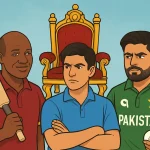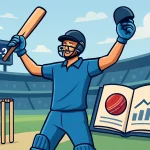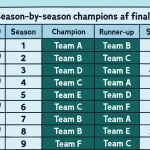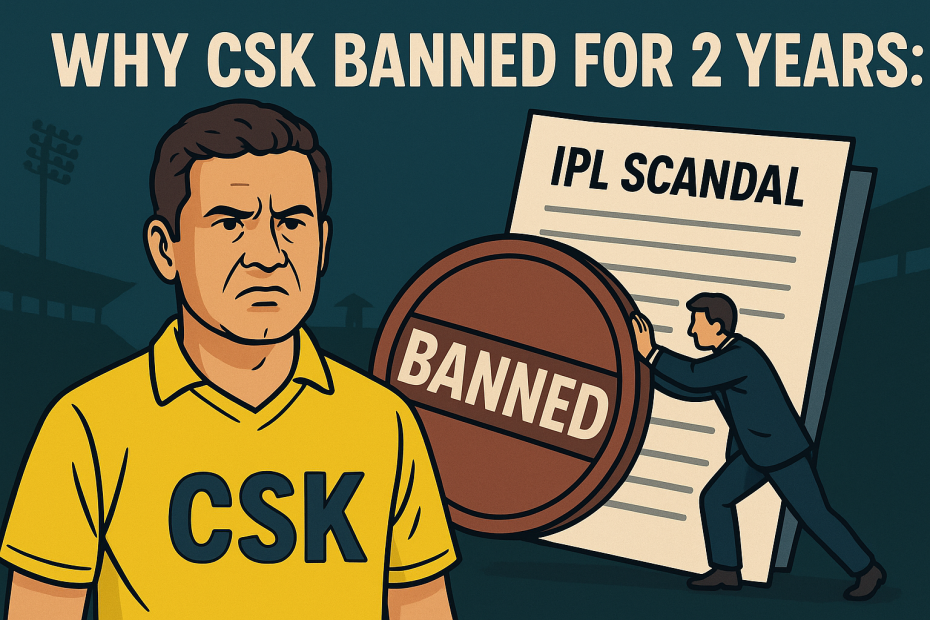When Chennai Super Kings were suspended from the IPL for two seasons, it didn’t just make headlines — it shook the foundations of Indian cricket. The ban wasn’t just about a team being sidelined. It was about power, shadows in boardrooms, and a dirty crisis that exposed the sport at its most vulnerable. As someone who has lived through the inner workings of Indian cricket — coaching, analyzing, and sitting behind some of those decision-making tables — let me take you beyond the headlines. Let’s talk about why CSK was banned for two years, the players and stakeholders involved, what the Lodha panel was really chasing, and what this scandal truly meant for the IPL and cricket’s soul.
Quick Overview: Key Facts of the CSK Ban
| Element | Details |
|---|---|
| Team | Chennai Super Kings (CSK) |
| Ban Duration | Two IPL seasons |
| Key Individuals Involved | Gurunath Meiyappan, N. Srinivasan, Raj Kundra |
| Governing Body Decision | Based on Lodha Committee recommendations |
| Trigger Incident | IPL spot-fixing and betting scandal |
| Related Teams | Rajasthan Royals also banned |
| CSK Comeback | Returned and won IPL title after suspension |
Setting the Stage: What Led to the Scandal?
For years, CSK had been the golden franchise of the Indian Premier League — consistently successful, fiercely loyal fanbase, and led by none other than MS Dhoni. But what looked like stability and brilliance on the field had cracks underneath. The first signs of trouble emerged when whispers of betting, conflict of interest, and internal manipulation started growing louder.
The trigger moment was the IPL spot-fixing controversy. It wasn’t just about a few overs thrown or a compromised player. This was systemic. Deeply entrenched relationships and a defeat of governance.
Let’s go into the events that caused one of India’s most iconic cricket franchises to fall.
Who Was Gurunath Meiyappan and Why Was He Crucial?
To understand the CSK suspension, everything begins with one man: Gurunath Meiyappan.
He wasn’t a cricketer. But his presence lingered in the team dugout more prominently than some squad members. Introduced at pressers as Team Principal of Chennai Super Kings, Meiyappan’s proximity to CSK was undeniable, visually and operationally. But officially, the franchise — owned by India Cements — claimed he held no official role.
Here’s the twist: Gurunath was also the son-in-law of then BCCI President N. Srinivasan, the Managing Director of India Cements, which owned CSK.
Can someone so close to the team, and to the most powerful man in BCCI, bet on IPL matches? That’s the question that shook the sport.
▶️ What Was Meiyappan Accused Of?
Investigations by Mumbai Police and later by judicial probes found that Meiyappan was betting on matches, including those involving CSK. His name popped up during the arrest of bookie Vindoo Dara Singh.
During police interrogation, Meiyappan admitted to betting. That blew the doors open.
▶️ Conflict of Interest: A Blind Eye Turned
The scandal highlighted how deeply conflicted the power structures were in Indian cricket. N. Srinivasan was not just BCCI President; he was running the IPL and had an ownership stake in CSK through India Cements. The conflict was glaring, yet no action had been taken until the scandal became too big to be covered.
The Lodha Committee Enters: Cleaning Up a Sport on Fire
In response to the outrage and unrest within Indian cricketing circles — and public pressure following spot-fixing revelations — the Supreme Court stepped in. It appointed a three-member committee led by former Chief Justice RM Lodha. Their brief? Recommend punishment and reform.
What emerged was a forensic-like investigation into IPL’s governance, structural rot, and rule violations.
🧾 What Did the Lodha Committee Find?
- Gurunath Meiyappan was indeed a team official. Denials by CSK were dismissed based on recordings, documents, and his consistent public involvement with the team.
- Meiyappan had engaged in betting. This was a clear Code of Conduct violation for team officials under the IPL Operational Rules.
- The franchise, CSK, was liable. Since Meiyappan was judged to be an official, CSK as a franchise bore institutional responsibility.
- Ownership conflict hurt credibility. The dual role of Srinivasan as BCCI boss and CSK part-owner was deemed dangerous to the sport’s integrity.
Based on this, the Lodha panel recommended that CSK be suspended for two IPL seasons, alongside Rajasthan Royals, whose co-owner Raj Kundra had also been found guilty of illegal betting.
IPL Betting Scandal vs Match-Fixing — What’s the Difference?
Let’s clarify something that fans often confuse.
- • Match-fixing is when a player purposely underperforms or alters an outcome of a match.
- • Betting is wagering money on aspects of the game. BCCI and ICC anti-corruption policies strictly prohibit betting by team owners, players, officials, and staff.
While there’s no conclusive proof that CSK players fixed matches, Meiyappan’s betting activities — especially on his own team — were enough to blow the integrity of the league apart.
That distinction matters. Because it determines penalty type. CSK was banned not because players were caught cheating, but because the system around them was compromised.
Why Did Both CSK and Rajasthan Royals Get the Same Ban?
While CSK’s case involved Meiyappan, Rajasthan Royals’ co-owner Raj Kundra was also found guilty of betting — specifically on his own team’s matches.
The parallel here:
| Element | Chennai Super Kings | Rajasthan Royals |
|---|---|---|
| Accused Official | Gurunath Meiyappan | Raj Kundra |
| Role in Team | Team Principal (claimed) | Co-owner |
| Allegation | Betting + inside info leak | Betting |
| Lodha’s Judgment | Official: breach confirmed | Owner: breach confirmed |
| Penalty | 2-year suspension | 2-year suspension |
The committee made it clear. The sanctity of the IPL was compromised. Regardless of team stature or championship history, if owners or officials breach trust, the franchise should not participate.
Was CSK’s Ban Fair? A View from Inside Indian Cricket
Let’s be brutally honest here.
There were those inside the cricketing circuit who felt CSK’s ban was a political hammer in a power battle between rival boardroom factions. There’s no denying that the BCCI has always had internal camps — Srinivasan had his loyalists, but also many critics.
Yet unbiased voices agreed that the punishment, though severe, was necessary.
Franchises operate within the brand and rules of the IPL. You cannot have a team official betting — especially when you’re sitting at the epicenter of the league’s elite.
If the BCCI had let CSK continue without punishment, it would have silenced the last remaining smolder of sporting fairness from the league.
So yes, the ban was painful, but it was essential to restore credibility.
The Comeback: Redemption Like No Other
Two years away from the limelight. Two years of silence and rebuilding — yet no fanbase deserted CSK. This is the part that still gives me goosebumps.
When CSK returned, they were older. Many thought the Dhoni era had passed. But they didn’t just return — they won the IPL title with the very core that had once made them famous.
Their comeback was not just sporting. It was emotional — a cultural moment in Indian cricket.
🟡 Key Players in CSK’s Return:
- MS Dhoni – Calm, composed, determined
- Shane Watson – Player of the final
- Dwayne Bravo – Key death bowler
- Ambati Rayudu – Consistent with the bat
The “Dad’s Army” — as they were nicknamed in jest — silenced critics and reestablished their throne.
Long-Term Impact of CSK’s Ban on IPL
Let’s not look at this in isolation.
Here’s how the CSK suspension changed the IPL forever:
- 🔹 Governance Reform
The BCCI was forced to decouple ownership from administration. Individuals holding powerful roles in Indian cricket could no longer own franchises without checks. Conflict-of-interest norms grew teeth. - 🔹 ACU Investment
Anti-Corruption Units monitoring the league got better — more surveillance, education modules for players, stricter vetting for team staff. - 🔹 Fan Ownership Culture
The scandal led to greater awareness among fans. Support was now more nuanced — sports viewers today are more ethically invested than ever before. - 🔹 Brand Redemption
CSK’s post-suspension success became the blueprint for resilience and redemption.
Frequently Asked Questions
Q: What was the reason CSK was banned from the IPL?
Chennai Super Kings were banned due to the involvement of their Team Principal Gurunath Meiyappan in illegal betting activities. The Lodha Committee determined he was a team official, and CSK was held liable for his actions under IPL rules.
Q: Who was involved in the CSK betting scandal?
Gurunath Meiyappan, who regularly represented CSK at matches and strategy sessions, was identified as a key figure in the betting operation. His familial ties to N. Srinivasan exacerbated the concerns of conflict of interest.
Q: What is the significance of the Lodha Committee?
The Lodha Committee, appointed by the Supreme Court, was tasked with recommending punishment and reform in Indian cricket following revelations of corruption in the IPL. Their rulings led to the CSK and RR bans and systemic changes in BCCI governance.
Q: When did CSK return to the IPL after the ban?
Chennai Super Kings returned two years after their suspension and went on to win the IPL trophy in their comeback season — an unprecedented achievement in league history.
Final Thoughts: Why This Ban Will Always Matter
Some call it a blot, others a rebirth. But if you’re truly paying attention, the CSK ban was a defining moment in Indian cricket history — one that cut deep but healed wiser.
It tore open the illusion that a successful franchise could operate unaccountable. It showed us that even the game’s giants aren’t above governance. And most importantly, it taught a generation of administrators what happens when the greed of a few overshadows the passion of millions.
CSK today aren’t just a team. They’re a statement. A lesson that redemption is real, but only when you accept the weight of your past.
Let that never be forgotten.
—
🟡 Still wondering “why was CSK banned for 2 years”? Hopefully, now you not only know the ‘what’ but also the ‘why,’ the ‘who,’ and the unflinching truth of what went on behind cricket’s brightest stage.
And if you ever doubt the power of cricket’s emotional soul — remember the comeback that silenced the whispers, roared past the doubts, and proved once again, Chennai Super Kings always rise.
ⓘ Article optimized for: ‘why CSK banned for 2 years’, ‘CSK IPL suspension’, ‘IPL betting scandal’, ‘Lodha Committee CSK’, ‘Gurunath Meiyappan case’, ‘CSK comeback’, and related variations.
Related posts:
Cricket Prince: Who's the Heir — Lara, Gill, or Babar?
T20 Highest Score Guide: Team Totals, Records & Context
Youngest cricketer in India: Complete Guide to Records & Pathways
Psl winners list: Season‑by‑season champions & finals
About vignesh puthur - Official bio, work & contact
How Many Countries Play Cricket? 108 ICC Members (Updated Oct)
Angad Mehra

- Angad Mehra is an avid cricket analyst and sports writer who pays attention to betting patterns and match specifics. Angad has years of experience writing, covering both Indian and international cricket. He explains stats, odds, and strategies in a clear, simple manner that resonates with fans. Readers trust Angad’s articles to keep them ahead of the game whether on or off the field. Off the field, you can find him either tracking live scores ball by ball or debating IPL lineup changes.
Latest entries
 GeneralNovember 1, 2025Cricket Prince: Who’s the Heir — Lara, Gill, or Babar?
GeneralNovember 1, 2025Cricket Prince: Who’s the Heir — Lara, Gill, or Babar? GeneralOctober 31, 2025T20 Highest Score Guide: Team Totals, Records & Context
GeneralOctober 31, 2025T20 Highest Score Guide: Team Totals, Records & Context GeneralOctober 29, 2025Youngest cricketer in India: Complete Guide to Records & Pathways
GeneralOctober 29, 2025Youngest cricketer in India: Complete Guide to Records & Pathways GeneralOctober 27, 2025Psl winners list: Season‑by‑season champions & finals
GeneralOctober 27, 2025Psl winners list: Season‑by‑season champions & finals
